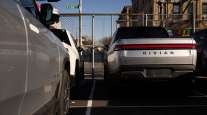Bloomberg News
Rivian’s Tesla Alums Lead Charge as Debut Nears for First Three EVs

[Stay on top of transportation news: Get TTNews in your inbox.]
Rivian Automotive Inc. will soon set off on an aggressive sprint to upend the electric-vehicle business, with plans to start selling three models — a pickup truck, SUV and delivery van — in a matter of months. For this ambitious effort, it has harnessed powerful weapons: former Tesla Inc. engineers who launched the company’s Model 3 sedan.
Charly Mwangi, Rivian’s manufacturing chief, and Nick Kalayjian, head of engineering, played key roles in bringing Tesla’s lowest priced car to market in 2018. Each briefly worked at other startups before being lured to Rivian by the unique thrill of launching new vehicles, including the R1T, a truck geared to outdoor enthusiasts, that will go on sale in June.
They are not alone. Bloomberg has identified more than 50 high-level roles at Rivian occupied by former Tesla employees, from director to executive vice president. Including senior managers, that number rises to more than 100. In dotting its leadership ranks with veterans of the industry’s pre-eminent incumbent, Rivian has moved to improve its chances of emerging as the most credible challenger to Elon Musk’s electric car empire.
Rivian, an Amazon.com Inc.-backed automaker that has raised more than $8 billion, has grown to more than 5,100 global employees and is adding roughly 150 people per week. It has scored talent from a wide range of employers, including General Motors Co., Apple Inc. and Ford Motor Co., a Rivian investor.
But the Tesla hires stand out. Alumni of the automaker are in higher concentration in Rivian’s middle and upper management, giving CEO R.J. Scaringe invaluable experience to leverage as he takes on Musk and seeks to avoid repeating his mistakes.

Next-level technologies hold the potential to enhance safety and efficiency in transportation, but it takes a lot of work behind the scenes to advance these ideas from concept to reality. We talk with Christoph Mertz of the Robotics Institute at Carnegie Mellon and Huei Peng of the University of Michigan. Hear a snippet above, and get the full program by going to RoadSigns.TTNews.com.
Tesla clearly sees Rivian as a threat. In July, it sued Rivian and accused the company of poaching its employees, particularly on its recruiting team. Cindy Nicola, Rivian’s vice president of talent acquisition, was Tesla’s vice president of global recruiting for roughly four years.
In response, Rivian claimed Tesla was using the suit to intimidate its employees, keeping them from leaving the company, and asked a judge to toss the suit. The court did not oblige. In March, Santa Clara County Superior Court Judge William Monahan allowed Tesla to move forward with its suit. Rivian is headquartered in Irvine, Calif., and its factory is in Normal, Ill.
“People moving from car company to car company is not a shock. I don’t think that’s ever been an issue,” said Jessica Caldwell, Edmunds executive director of insights. “The difference now is that a lot of this is emerging technology: It’s not something that’s the same as the basic engineering of a car that’s been around for decades.”
Hiring Spree
One-time Tesla workers can be found across a wide range of teams at Rivian. In December, Vidya Rajagopalan joined Rivian as vice president of engineering and hardware, reporting to Kalayjian, who is 48. Rajagopalan managed teams developing automotive electronics at Tesla before leaving in July 2019. Jimmy Knauf, Rivian’s executive vice president of facilities, held a similar facilities role at Tesla until 2018. There are also former Tesla managers at the director or vice president level across human resources, talent acquisition, supply chain and operations. Rivian declined to make employees available for interviews for this story.
Hiring managers at Rivian have asked Tesla alumni in their ranks to recommend two or three people they held in high regard at their former employer, according to people familiar with the matter. Mwangi, 41, has been particularly active in securing former teammates, the people said.

Rivian's R1S SUV. (Jeff Johnson/Rivian Automotive Inc.)
Specific hires have been made to deal with specific problems. Shawn Hensen, for example, was brought on by Rivian as a senior director of manufacturing to address problems with the body line — where the structural shell of the car is fit and welded together, according to people familiar with the matter. Prior to Rivian, Hensen was at Tesla for more than six years including as director of body manufacturing engineering.
“Like most fast-growing companies, Rivian encourages every new hire to refer the smartest and most driven problem solvers they’ve ever interacted with; it could be an ex-classmate, a friend or former colleagues from throughout their careers. We don’t — and have never had — a recruiting program around a specific company,” Chief People Officer Helen Russell said by email.
Certain key hires coincided with a bigger strategy shift at Rivian. Last year, when the company was in a crucial pre-production phase in the depths of a global pandemic, it reset its manufacturing planning and organizational structure, according to people familiar with the matter. Rivian also revised some of its operational methods and made leadership changes, the people said, including the addition of Kalayjian. He had just the right résumé for the moment.
“The ideal scenario is finding someone who can scale up, scale back down and then scale up again. Finding someone who has seen this movie before,” said Ian Bolin, who leads the North America automotive practice at industry headhunter Egon Zehnder.
In The Bunkhouse
In the last 12 months or so, Rivian has hired more than 3,000 people. Of that group, some 130 are former Tesla employees, so the overall number of Tesla alumni is small. Some came directly from Tesla’s Fremont or Reno, Nevada, operations; others had detours to other startups.
Battle-scarred but proud veterans of Musk’s singular engineering and manufacturing boot camp can be found throughout Silicon Valley, from established companies like Apple to upstarts such as Lucid and Proterra. Those jumping from Tesla to Rivian will find Scaringe is regarded by staff as less of a micromanager than Musk. They say he’s more willing to allow his top generals to act on problems, but is just as inclined to be in the engineering trenches as Musk is famed to be. Last year, on a cold-weather testing trip to put the car’s handling and systems through their paces in extreme temperatures, Scaringe opted to stay in the bunkhouse with his engineers, a gesture that went down well with the team. Last year, he moved his family from California to be with him day-to-day nearer to the company’s plant in Normal. Where Musk and Tesla executives had animosity toward traditional processes and procedure, Rivian favors open discussion and collaborative working that are similar to practices at legacy automakers, said employees of the company who asked not to be identified discussing private information.
Rivian has taken a cautious, deliberate approach to pre-production and has an aversion to cutting corners. Employees say this is an attempt to learn lessons from Tesla, which had to take extraordinary measures in 2018 to get the Model 3 over the finish line. Tesla nearly went bankrupt launching that vehicle, a bet-the-company effort that included building a giant tent adjacent to the Fremont factory to add production capacity after Musk realized, late in the game, that Tesla had over-relied on automation. In the drama-filled year defined by that notorious “production hell” and Musk’s botched attempt to take the company private, scores of executives left Tesla.
Scaringe is not trying to imitate his biggest rival’s corporate culture.
Rivian remains a minnow compared to Tesla, and its chief is an unproven leader. Scaringe holds a doctorate in mechanical engineering from Massachusetts Institute of Technology but has no previous experience leading or growing companies, and Rivian has yet to produce any vehicles in volume. When Scaringe’s trucks hit the market, they’ll be vying for customers alongside Musk’s behemoth, which has 80,000 employees and a market value of around $556 billion as of Monday’s close. Some of investors’ faith in Tesla reflects a cult of personality around Musk that has delivered him 50 million Twitter followers and a recent turn as host of “Saturday Night Live.”
The optimism about Tesla makes for a high-pressure product launch for Rivian. The newcomer, at least, has an important buffer built into its business model. Rivian has an order from Amazon for 100,000 electric delivery vans. The e-commerce giant has said it expects 10,000 of the vans to be on roads making deliveries by 2022, and the rest of the order is due by the end of the decade.
IPO Anticipation
With its entry to the U.S. market imminent, Rivian already has its eye on its next phase of growth. That, too, will rely on the know-how of a former Tesla manager. The company has hired Justin Hickel to help with its European manufacturing plans, according to people familiar with the matter. Hickel was a construction manager overseeing the buildout of Tesla’s gigafactory on the outskirts of Berlin.
Rivian is competing with several startups, including Lucid and Fisker Inc., in a race to hire from a finite pool of talent that has had experience building electric vehicles, as each readies to challenge Tesla and planned offerings from legacy players like GM and Ford.
To attract such workers, the company is offering equity as part of compensation and a four-year vest period, according to people familiar with the matter. Those are typical terms for automotive startups, but Rivian is also dangling the prospect of an initial public offering to potential new hires, the people said. That could be a powerful enticement.
“When people have experienced it, they want to experience it again,” said Bolin, the headhunter. “If they haven’t experienced it, it’s a new world.”
Want more news? Listen to today's daily briefing below or go here for more info:




